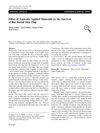 20 citations,
December 2015 in “Journal of Pharmacopuncture”
20 citations,
December 2015 in “Journal of Pharmacopuncture” Thread-embedding therapy helped hair grow back in mice and might do the same in humans.
 3 citations,
February 2008 in “Basic and clinical dermatology”
3 citations,
February 2008 in “Basic and clinical dermatology” Telogen Effluvium is a hair loss condition where treatment involves identifying and managing its triggers.
 1 citations,
May 2017 in “InTech eBooks”
1 citations,
May 2017 in “InTech eBooks” Some cosmetic procedures show promise for treating hair loss, but more research is needed to confirm their safety and effectiveness.
 6 citations,
November 2017 in “Dermatologic Therapy”
6 citations,
November 2017 in “Dermatologic Therapy” Combining mometasone furoate cream with adapalene gel is safer and more effective for hair regrowth in alopecia areata than using the cream alone.
 May 2023 in “Scientific Reports”
May 2023 in “Scientific Reports” The seed extract of Lepidium sativum L. can potentially treat hair loss, showing effects similar to 5% minoxidil.
 January 2023 in “International Journal of Dermatology and Venereology”
January 2023 in “International Journal of Dermatology and Venereology” Many people experienced hair loss after having COVID-19, with the worst cases in hospitalized patients, and some saw hair regrowth within six months.
 September 2024 in “Journal of the American Academy of Dermatology”
September 2024 in “Journal of the American Academy of Dermatology” The patient responded well to treatment with no disease progression.
 April 2024 in “International Journal of Dermatology”
April 2024 in “International Journal of Dermatology” Filler injections can cause temporary hair loss, but hyaluronidase can help restore hair within a few months.
 April 2024 in “Nigerian Postgraduate Medical Journal”
April 2024 in “Nigerian Postgraduate Medical Journal” Androgenetic alopecia is a common hair loss condition influenced by various factors and linked to psychosocial and cardiovascular issues.
 April 2021 in “European journal of medical and health sciences”
April 2021 in “European journal of medical and health sciences” The pandemic stress may have increased alopecia cases in Bangladesh.
 6 citations,
April 2017 in “Frontiers in Pharmacology”
6 citations,
April 2017 in “Frontiers in Pharmacology” Chinese medicine may help treat hair loss by affecting genes and enzyme activity.
 September 2021 in “Revista Interdisciplinar em Saúde”
September 2021 in “Revista Interdisciplinar em Saúde” Oral isotretinoína effectively stabilizes frontal fibrosing alopecia.
 1 citations,
March 2023 in “Clinical, Cosmetic and Investigational Dermatology”
1 citations,
March 2023 in “Clinical, Cosmetic and Investigational Dermatology” Current treatments for Alopecia Areata have mixed success, and there's a need for better, more accessible options and support for affected individuals.
 April 2024 in “Scientific reports (Nature Publishing Group)”
April 2024 in “Scientific reports (Nature Publishing Group)” Rosemary and neem extract may be an effective natural treatment for dandruff and hair loss.
 6 citations,
September 2012 in “Aesthetic Plastic Surgery”
6 citations,
September 2012 in “Aesthetic Plastic Surgery” Minoxidil applied before and after surgery improves skin flap survival in rats.
 45 citations,
August 2011 in “Journal of Microencapsulation”
45 citations,
August 2011 in “Journal of Microencapsulation” Chitosan microparticles improve minoxidil sulphate delivery, potentially reducing daily applications.
 19 citations,
October 2017 in “European Journal of Pharmaceutics and Biopharmaceutics”
19 citations,
October 2017 in “European Journal of Pharmaceutics and Biopharmaceutics” The gel made of minoxidil and hydroxypropyl-β-cyclodextrin improves hair growth and is good for long-term use.
 13 citations,
January 2016 in “Journal of the Egyptian Women's Dermatologic Society (Print)”
13 citations,
January 2016 in “Journal of the Egyptian Women's Dermatologic Society (Print)” Minoxidil works faster and is more cost-effective for treating hair loss, but platelet-rich plasma microneedling can be an alternative for those who can't use minoxidil.

Intradermotherapy with minoxidil is as effective as topical application for treating hair loss.
 4 citations,
September 2014 in “Elsevier eBooks”
4 citations,
September 2014 in “Elsevier eBooks” Use some skin medications with caution during pregnancy; avoid strong steroids, certain eczema treatments, and systemic retinoids, but many topical treatments and nasal sprays are safe.
 20 citations,
March 2006 in “Seminars in Cutaneous Medicine and Surgery”
20 citations,
March 2006 in “Seminars in Cutaneous Medicine and Surgery” Minoxidil and finasteride can help with hair loss, but more research is needed to improve treatments for certain types of hair loss.
 10 citations,
December 2019 in “International journal of medicinal chemistry”
10 citations,
December 2019 in “International journal of medicinal chemistry” Chemicals from the plant Dicerocaryum senecioides were found to safely speed up and increase hair growth in mice.
 3 citations,
February 2021 in “Medical journal, Armed Forces India”
3 citations,
February 2021 in “Medical journal, Armed Forces India” Combination therapy promotes better hair growth and density.
 39 citations,
November 2015 in “Nanomedicine”
39 citations,
November 2015 in “Nanomedicine” Improved Finasteride delivery for hair loss treatment.
11 citations,
January 2019 in “International Journal of Trichology” Mesotherapy is not significantly better than minoxidil for treating male hair loss.
 14 citations,
October 2020 in “Natural Products and Bioprospecting”
14 citations,
October 2020 in “Natural Products and Bioprospecting” Various treatments, including FDA-approved drugs, natural products, and oral supplements, can help with hair loss, but a patient's medical history and potential allergies should be considered when choosing a treatment.
 1 citations,
October 2013 in “Actas Dermo-Sifiliográficas”
1 citations,
October 2013 in “Actas Dermo-Sifiliográficas” Customized medications made through compounding can be beneficial for various skin conditions but require careful regulation and collaboration between doctors and pharmacists.
 January 1987 in “Side effects of drugs annual”
January 1987 in “Side effects of drugs annual” Some cosmetics and dermatological drugs can cause allergic reactions and side effects, like skin irritation and systemic issues.
 January 2014 in “American Journal of Medicine and Medical Sciences”
January 2014 in “American Journal of Medicine and Medical Sciences” Minoxidil, originally a blood pressure medication, is effective in treating hair loss in men and women, with different strengths recommended for each.
 52 citations,
June 2009 in “Current Opinion in Endocrinology, Diabetes and Obesity”
52 citations,
June 2009 in “Current Opinion in Endocrinology, Diabetes and Obesity” The document concludes that hair transplantation and gene therapy may be important for future hair loss treatment.





























